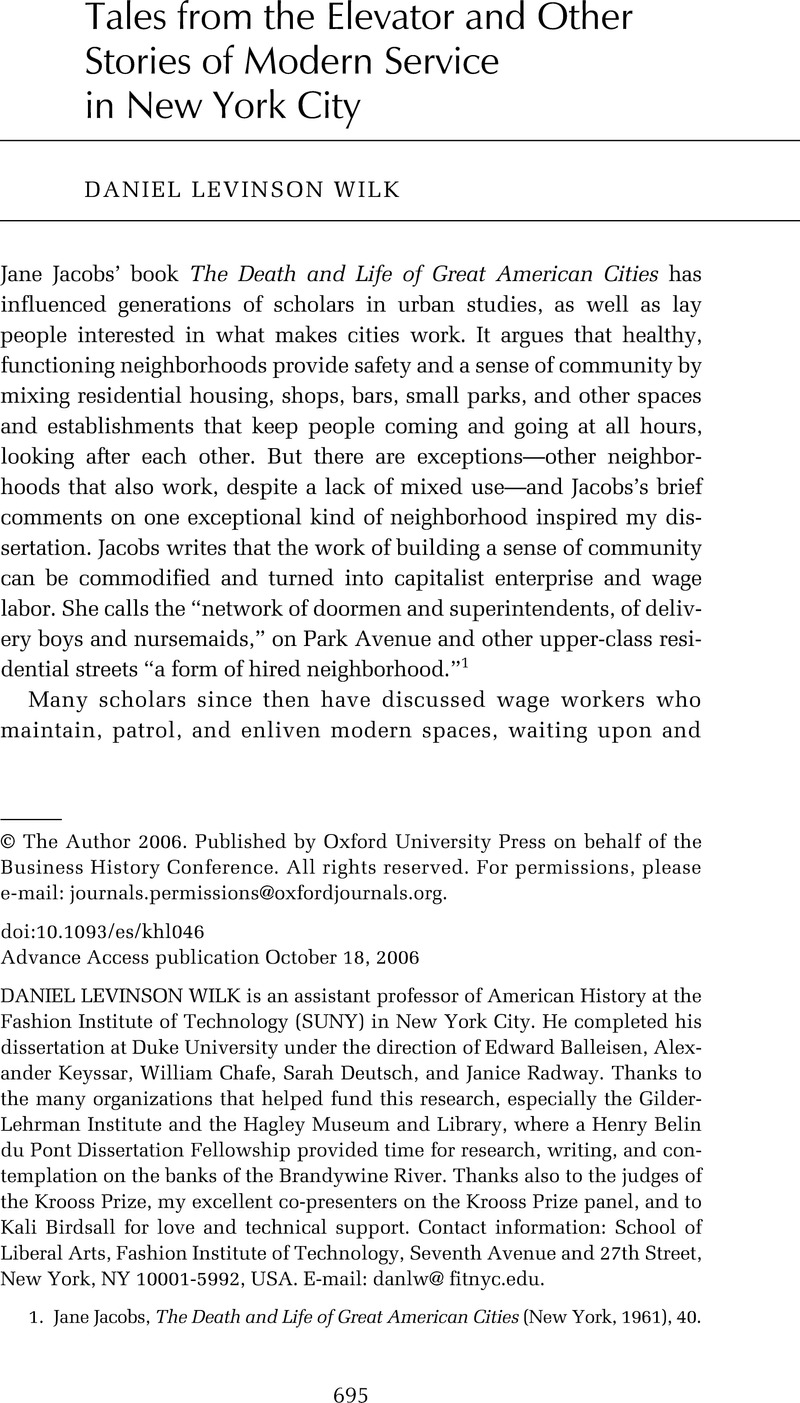Published online by Cambridge University Press: 18 February 2015

1. Jacobs, Jane, The Death and Life of Great American Cities (New York, 1961), 40.Google Scholar
2. For the first category, see Hardt, Michael and Negri, Antonio, Multitude: War and Democracy in the Age of Empire (New York, 2004)Google Scholar; Hochschild, Arlie Russell, The Commercialization of Intimate Life (Berkeley, Calif., 2003)Google Scholar; Hochschild, Arlie Russell, The Managed Heart: Commercialization of Human Feeling (Berkeley, Calif., 1983)Google Scholar. For the second, see, for example, Tye, Larry, Rising from the Rails: Pullman Porters and the Making of the Black Middle Class (New York, 2004)Google Scholar; Arnesen, Eric, Brotherhoods of Color: Black Railroad Workers and the Struggle for Equality (Cambridge, Mass., 2001)Google Scholar; Cobble, Dorothy Sue, Dishing it Out: Waitresses and Their Unions in the Twentieth Century (Urbana, Ill., 1991)Google Scholar; Norwood, Stephen H., Labor’s Flaming Youth: Telephone Operators and Worker Militancy, 1878–1923 (Urbana, Ill., 1990)Google Scholar; Benson, Susan Porter, Counter Cultures: Saleswomen, Managers, and Customers in American Department Stores, 1890–1940 (Urbana, Ill., 1986)Google Scholar; Melosh, Barbara, “The Physician’s Hand”: Work Culture and Conflict in American Nursing (Philadelphia, 1982)Google Scholar; Braverman, Harry, Labor and Monopoly Capital: The Degradation of Work in the Twentieth Century (New York, 1974), 359–74.Google Scholar
3. See, for example, Wilson, William Julius, When Work Disappears: The World of the New Urban Poor (New York, 1996), 31Google Scholar; Bluestone, Barry and Harrison, Bennett, The Deindustrialization of America: Plant Closings, Community Dismantlement, & the Abandoning of Basic Industry (New York, 1982), 27Google Scholar; Lichtenstein, Nelson, State of the Union: A Century of American Labor (Princeton, N.J., 2003), 195.Google Scholar
4. Katzman, David M., Seven Days a Week: Women and Domestic Service in Industrializing America (New York, 1978)Google Scholar; Dudden, Faye E., Serving Women: Household Service in Nineteenth-Century America (Middletown, Conn., 1983)Google Scholar; Sutherland, Daniel E., Americans and their Servants: Domestic Service in the United States from 1800 to 1920 (Baton Rouge, La., 1981)Google Scholar.
5. Strasser, Susan, Never Done: A History of American Housework (New York, 1982), 173–76Google Scholar; Cowan, Ruth Schwartz, More Work for Mother: The Ironies of Household Technology from the Open Hearth to the Microwave (New York, 1983)Google Scholar.
6. The graph compares the number of domestic servants with selected occupations in service industries. It does not include managerial jobs in service industries, many occupations like chambermaid and bellhop that are hard to track through the census, or workers in complementary and competing businesses like boarding houses, brothels, and commercial laundries. If it had included all these people, the shift from servitude to service would appear more dramatic, as it certainly was.
7. Farquhar, George, The Beaux’ Stratagem (1711; Lincoln, Nebraska, 1977)Google Scholar; Grand Hotel (MGM, 1932).
8. See, for example, Lebhar, Godfrey M., Chain Stores in America, 1859–1962 (New York, 1963)Google Scholar.
9. Benson, Counter Cultures; Leach, William, Land of Desire: Merchants, Power, and the Rise of a New American Culture (New York, 1993)Google Scholar; Jakle, John A. and Sculle, Keith A., The Gas Station in America (Baltimore, Md., 1994)Google Scholar.
10. For a more explicit treatment of this point, see the forthcoming book by Sandoval-Strausz, A. K., Hotel: An American History (New Haven, Conn.).Google Scholar
11. Chandler, Alfred D. Jr., The Visible Hand: The Managerial Revolution in American Business (Cambridge, Mass., 1977)Google Scholar; Chandler, Alfred D. Jr., Inventing the Electronic Century: The Epic Story of the Consumer Electronics and Computer Industries (Cambridge, Mass., 2005)CrossRefGoogle Scholar.
12. Scranton, Philip, Endless Novelty: Specialty Production and American Industrialization, 1865–1925 (Princeton, N.J., 1997)Google Scholar; Raff, Daniel M. G., Lamoreaux, Naomi R., and Temin, Peter, “Beyond Markets and Hierarchies: Toward a New Synthesis of American Business History,” American Historical Review 108 (April 2003): 404–33.Google Scholar